
It’s in the bag for Cibona
By Andrew Joseph, Features Editor
Automation Air Liquide Canada Canadian Food Inspection Agency Cibiona Foods Inc CombScale Inc Super SealQuebec food processor sharpens up its packaging skillset with new bagging machinery for its busy foodservice line
Quality and taste are never out of fashion when it comes to packaged food products, but it is important to keep your packaging capabilities and know-how up to date to keep your customers and consumers happy and loyal, as folks at Cibona Foods Inc. know very well.
Started up in 1988 in Saint-Laurent, Que., the family-owned business has seen its fortunes grow in leaps and bounds over the years—today employing 20 people at a tidy, 36,000-square-foot processing and packaging facility specializing in the so-called “transformed” food product like olives and cherries, along with a smaller, 8,000-square-foot sister plant operating nearby.
“We specializes in the processing of a wide range of very high quality products like maraschino cherries, gherkins, capers, marinades, Greek peppers, pickled cauliflowers, small silver-skin onions and olives—offered in a range of containers and packages,” relates company founder and president Ljuban Ljubisic, adding that all of his Kosher-approved products are produced in accordance with a strictly-observed quality control program regularly recertified by a third-party auditor on behalf of the federal Canadian Food Inspection Agency (CFIA).
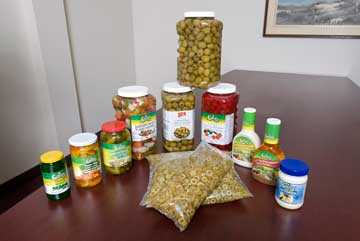
A sampling of Cibona’s growing range of condiments and other products made and packaged at the company’s production facilities in Saint-Laurent, Que.
“When I first started up my Canadian business from within my home’s garage, I was packing olives for a customer who never paid me for the work,” recalls Ljubisic, relating that he chose the company name as a personal tribute to a successful, well-known basketball team in his native former Yugoslavia.
“But despite losing money on that deal, I vowed that I would be a success in my business and that I would never cut corners and would never offer customers anything less than my very best products.”
Sticking to his principles enabled Ljubisic to grow his business to a point where the company was able to purchase a second smaller plant last year to begin production of mayonnaise and various mayonnaise-based products, along with salad dressings and vinaigrettes,
“All of these products have also been very well-received by our customers for their superb quality and taste,” Ljubisic told Canadian Packaging in a recent interview, citing the company’s hard-earned reputation for high product quality and exceptional taste profile as key competitive advantages.
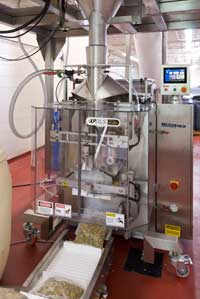 “I would rather be selling a higher-priced product than resort to sacrificing quality—and my customers know and appreciate this,” he asserts, citing cherries and olives—the latter now sold in over 25 different SKUs (stock-keeping units)—as the company’s bestselling product lines.
“I would rather be selling a higher-priced product than resort to sacrificing quality—and my customers know and appreciate this,” he asserts, citing cherries and olives—the latter now sold in over 25 different SKUs (stock-keeping units)—as the company’s bestselling product lines.
“I would not put my label on anything that is not a quality product,” states Ljubisic, adding he would rather turn down requests to supply customers with lower-quality, inexpensive products if it risked compromising his exacting high standards of processing and packaging excellence.
“That is why I never have to call my customers for new business; I get them calling me instead,” says Ljubisic. “They know that with us they will get best quality in taste, texture and aroma,” he adds.
“I offer superior quality in taste, texture and aroma; I’m like a chef in a restaurant—people will come back if the chef has created a nice plate.”
While Ljubisic admits that he works in a highly competitive business, with relatively thin profit margins, he says he truly enjoys the sense of satisfaction he gets out of keeping his customers happy by knowing he would never sell them an inferior product or cutting corners in any other way.
Now distributing its products nationwide through hundreds of Canadian distributors, Cibona now also exports some of its output to the U.S. and Russia, according to Ljubisic, who until recently used to travel the world himself to seek out and sample the raw products processed by his company—finally leaving this task to professional brokers in order to concentrate on improving Cibona’s production and packaging capabilities.
“They know I will not work with them again if they let me down,” says Ljubisic, adding he applies the same exacting standards when it comes to installing new packaging machinery at his company’s operations.
“I’m truly fanatical about this business,” states Ljubisic. “Not only do I demand high quality products for my customers, I must have the best equipment to help me process and package it.
“That’s why I am always looking for new machinery to help make us a better company.”
Operating two packaging lines at the main Saint-Laurent location and another two lines at the smaller facility, Cibona recently turned its attention to improving the performance of its foodservice line, he relates, including installation of the Super Seal induction cap sealer, manufactured by Enercon Industries Corporation, which he says produces such a strong and reliable seal that it remains intact even if a jar of product gets accidentally dropped on the floor or is otherwise mishandled.
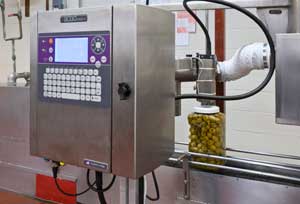
A small-character 9030 inkjet coder from Markem-Imaje applies filling date and other pertinent product information to the top of the lids of passing olive jars.
Similarly, the company recently began flushing a lot of its pouched products with nitrogen just before sealing—supplied by Air Liquide Canada— to maximize the product’s shelf-life and preserve its flavor for as long as possible.
“It retards spoilage and extends the product shelf-life, which we believe gives our products a competitive edge over the competition,” he states. “Furthermore, the gas acts as a protective cushion—protecting the product against possible damage during transit or from rough handling by the end-user.”
In early 2011, Cibona also purchased a new model XPDIUS Elite 1200 V/F/F/S (vertical form-fill-seal) bagging machine manufactured by the Montreal-headquartered packaging machinery manufacturer WeighPack Systems Inc., which also operates branches in Las Vegas, Nev., and Miami, Fla., to serve its growing U.S. client base.
Outfitted with a model PrimoWeigher 360 industrial multihead scale manufactured by CombiScale Inc., the new fully-automatic bagger is used by Cibona to bag wet and dry products for the company’s foodservice customers, according to Ljubisic.
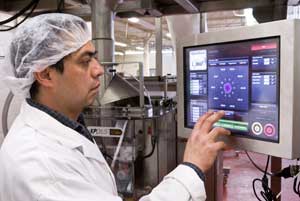
A Cibona employee uses a touchscreen panel to program the PrimoWeigher 360 multihead combination scale for the next product run.
While the WeighPack bagger is designed to reach top throughput speeds of up to 90 cycles per minute—depending on the size of the bags— Ljubisic says he has so far not exceeded speeds of about 20 cycles per minute due to the large bag sizes handled by the machine at Cibona.
“We purchased the XP Elite 1200 model, to help us increase our production line speed, and as well as to ensure our customers that we also run a clean operational environment at Cibona,” mentions Ljubisic. “We also like the fact that this machine can easily accommodate a variety of bag sizes—from 100 grams to 1,800-gram drain weight—which is a very handy feature considering how many different sizes of bagged products we provide to the foodservice sector.”
In operation, the olives packaged on Cibona’s foodservice line are first placed onto the WeighPack horizontal-discharge inclined infeed conveyor system—featuring plastic cleated belting and side-walls—and transferred up into a vibrating platform that drops them into one of ten 2.5-liter individual buckets that are mounted on the PrimoWeigher 360 weight sensors until reaching their preprogrammed target weight, after which the basket release the olives into the bags below.
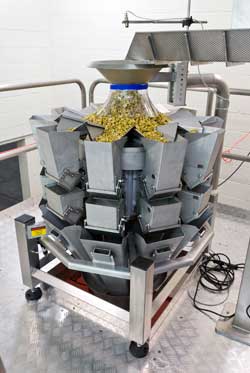
Freshly-processed olives flow down into the 2.5-liter buckets of the PrimoWeigher 360 scale in precisely-measured product quantities to the XPDIUS Elite 1200 bagger directly below for sealing.
“The bag is formed before the basket releases the olives, with the horizontal bottom seal and two vertical seals formed at the same time,” explains Ljubisic. “As the olives are released and flow down into the pouch bag, salt brine is added along with the pre-set amount of nitrogen gas.”
The top of the bag is then sealed once the cycle is finished, and it is then transferred to another conveyor system where it is placed in a carton with other finished bags, sealed, palletized and prepped for shipment to the customers.
Some of the key productivity-enhancing features incorporated into the XP Elite 1200 design include a mechanical brake mechanism; color touchscreen HMI (human-machine interface); motorized film unwind rollers; servo-driven sealing jaws; pneumatic horizontal sealing jaws; pneumatic vertical sealing bar; auto-retracting film assembly; variable temperature controls; encoder unwind length control; a servo-driven pull belt; and a safety guard switch.
“I also like the fact that it opens up on both sides, which grants us easy access to the jaws to make it easier to clean,” adds Ljubisic. “Moreover, it’s a truly tool-less machine in terms of parts changeovers.”
Another handy design advantage offered by the XP Elite 1200 bagger is the removal of the top plate and dancing bars to creates an open top for the film path—making the threading of the bag film faster and easier to do, according to Ljubisic, pointing out that the machine’s stainless-steel design is bereft of any nooks or crannies for bacteria to hide in, while the open frame concept reduces washdown times by 50 per cent, compared to other competing bagging systems.
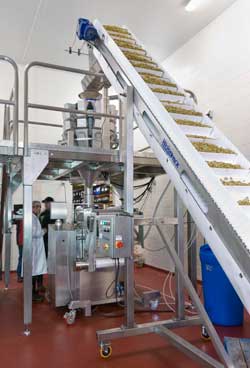
A WeighPack horizontal incline conveyor system moves sliced olives up to the PrimoWeigher 360 scale postitioned directly above the WeighPack XPDIUS Elite 1200 bagging system.
Ljubisic adds he is also impressed with the PrimoWeigher 360 combination scale’s online servicing capability that allows it to be serviced from virtually anywhere in the world at any time via special software that connects WeighPack’s service technicians directly to its operating system—providing real-time technical support and eliminating all the extra time associated with scheduling and executing a site visit to correct any problems.
In addition to using plastic film supplied by Terrebonne, Que.-based Excel-Pac Inc. to make its foodservice pouches, “We also use a special film for our pouch bags that is composed of an eco-friendly plastic material, and while it is a bit more expensive than conventional plastic films, it is much easier on the environment,” points out Ljubisic.
Other key packaging machinery employed by Cibona to keep its packaging operations running like clockwork includes:
• An RTF-DP filler, manufactured by the Fairfield, N.J.-based Solbern, for filling various-sized jars with olives, cherries and gherkin pickles, utilizing high-performance SEW-Eurodrive motors to power horizontal and vertical shaking of the product into the containers.
• A model 9030 small-character inkjet coder from Markem-Imaje to apply filling date and other product information to the top of the container caps used on the jar line.
• A new MY 1000 vacuum-steam sealing-capping machine from Massilly North America Inc.;
• A new Rotina cold-wrap adhesive labeler manufactured by Krones AG;
• A model LCB (Low Cost Briner) liquid jar filler from Solbern;
• A custom-designed washer and drier for the jar line that rinses off excess brine or sugar solution outside the jar or cap to ensure a clean package appearance and proper label placement and adhesion.
“Like any successful business, Cibona is always looking to provide its employees with the best new technologies, a safe environment, and the tools needed to ensure efficient production runs,” says Ljubisic.
“And although we will never sacrifice quality for price, we are nevertheless committed to helping our customers maintain healthy bottom lines,” he concludes.
“So if we can save a few pennies here and there through the use of more efficient and effective packaging equipment, you can be sure we will pass on those savings.
“Fo us, this has been a successful way for us to maintain Cibona’s competitive advantage.”
PHOTOS BY PIERRE LONGTIN
Advertisement

